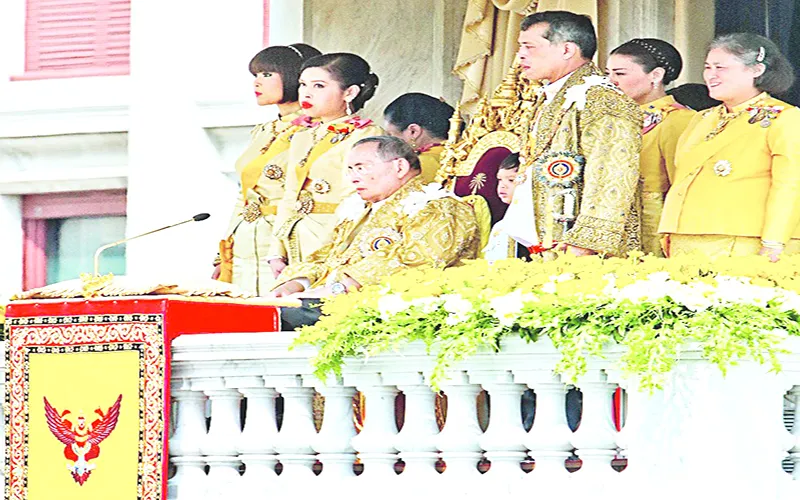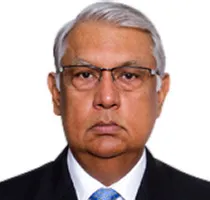Thailand appears to be heading for a royal change of guard at the very top. The widely revered and ailing 87-year-old king, Bhumibol Adulyadej or Rama IX of the Chakri dynasty, has not been seen in public for quite some time. Bhumibol is the world’s longest serving monarch, having ascended the throne in 1946. The wife of the crown prince, Maha Vajiralongkorn, Princess Srirasmi, has been ousted with the announcement that she has been stripped of all titles and privileges. The 43-year-old Srirasmi married Vajiralongkorn in 2001 as his third wife.Pictures and videos of Srirasmi in revealing dresses have surfaced in the public domain. The motive seems to be to malign her character and lower her standing among the public at large. There is also speculation in Bangkok that Vajiralongkorn, the crown prince and heir-apparent, has dumped the exiled former prime minister, Thaksin Shinawatra, and joined hands with the royal family and the military government that ousted the government of Thaksin’s sister, Yingluck Shinawatra, in May this year. The crown prince has reportedly fathered a son from another woman whom he has married secretly.
Bangkok’s elite and its allied royal family members detest Thaksin, who managed to influence and dominate Thai politics even from exile in Dubai. A former policeman, Thaksin made billions from his telecommunications empire and fought for power and control from abroad as a fugitive, after being sentenced to two years in prison in 2008. Thaksin had built a powerful lobby in the police. He also reportedly constructed a palace for Vajiralongkorn in an effort to secure the crown prince’s support. Srirasmi’s ouster coincides with the arrest of some of the country’s top policemen, including Pongpat Chayaphan, an uncle of Srirasmi and the head of the corruption-ridden Central Investigation Bureau. Thaksin had churned up Thai politics by building a formidable rural-based vote bank using public welfare programmes, and became prime minister in 2001. His politics sidelined the traditional royalist Democrat Party, which was unable to muster enough electoral support to thwart Thaksin. The royalists ultimately joined hands with the Thai army to oust Thaksin in a coup in 2006 and managed to convict him in a case involving the sale of shares in his telecommunications company. Thailand’s pliable judiciary and its royalist links ensured that Thaksin was convicted. This did not deter him and his party, in a new avatar, made a comeback. He installed his sister, Yingluck Shinawatra, as the first woman prime minister of Thailand, after fresh elections were held in 2011. She, too, was ousted by the Thai judiciary and the army again mounted a coup in May this year.
Thailand has the most stringent lese-majeste laws in the world. The developments surrounding Srirasmi have set tongues wagging in Thailand but the media practices drastic self-censorship, lest it fall foul of lese-majeste laws. Political intrigue and squabbling is endemic among the Bangkok elite, the royalty and politicians. The king and his conspiratorial queen, Sirikit, have lost their earlier sheen in the eyes of an increasingly sceptical public. It is widely rumoured that the king, ailing and frail for many years, may be nearing the end of his life. Members of the royalty, however, claim that his condition is stable. The king is reported to suffer from Parkinson’s disease, a progressive disorder of the nervous system. A gall bladder surgery in early November may have left him weaker than before. Over the last few years, the king has appeared in public in a wheelchair, has not spoken and, apart from waving weakly, has not shown any physical activity.
Media in Thailand have reported that Thai authorities have also seized assets worth more than $300 million including cash, gold, land deeds, amulets, Buddhist artworks and images from properties owned by the former CIB chief.Srirasmi owned an antique shop in Bangkok and a connection is sought to be made with her uncle’s large collection of antiques that were acquired by blackmail. As many as 50 law enforcement officials’ names are said to appear on a bribe payment record seized from a businessman connected with an oil-smuggling ring.The campaign against Srirasmi, a commoner from a humble background, has, therefore, been revived. An infamous video showing her topless during the birthday celebration of her pet dog in 2001 has resurfaced along with many photos of Srirasmi in various stages of undress. These are either taken by the crown prince or someone close to the couple. The Thai royal family never liked Srirasmi, who has been described at different times as a cocktail hostess or an aspiring singer. Royal family and privy council members are suspected to have bribed servants in the prince’s household to get hold of these pictures to discredit her. The plan is to ensure that Srirasmi does not become queen when Vajiralongkorn eventually becomes king. Another issue is Srirasmi’s son, nine-year-old Dhipangkor, who suffers from attention deficit hyperactivity disorder, making it difficult to put him in the line of succession after the 62-year-old prince. Another reason for Srirasmi’s ouster is that the prince now has another wife, his fourth, who has borne him a son. She is Suthid, a commoner and a former Thai Airways flight attendant. She lives in Munich where the prince visits her frequently.
The treatment being meted out to Srirasmi is not dissimilar to the banishing of the prince’s second wife,Yuvadhida Polpraserth. She, too, was a commoner. The prince got Yuvadhida commissioned as a major in the Royal Thai Army and she participated in royal ceremonies. After he met Srirasmi, Yuvadhida was accused of adultery and driven out of Thailand. She lives in London with their four children who were stripped of their passports and royal perquisites. One daughter was later rehabilitated and is now a princess. She was reportedly abducted from the United Kingdom at the prince’s behest.
Ever since the king, Bhumibol Adulyadej, suffered a stroke in July 2012 that ended his ability to play an active role in Thai political life, Thailand has been in the throes of a succession struggle. Royal family factions have fought over the competing candidates, Vajiralongkorn or his sister, the popular princess, Maha Chakri Sirindhorn. Maha Chakri remains single and has not shown any interest in marriage. The prince is not popular within the royal family for his shady dealings with Chinese gangsters, his womanizing and his apparent refusal to adhere to royal rules. The United States of America embassy cables, leaked by WikiLeaks in 2011, refer to these issues.The king, however, supported the claim of Vajiralongkorn in spite of his aberrant behaviour.Thailand’s stringent lese-majeste laws have prevented any discussion of the prince’s conduct.
Vajiralongkorn’s behaviour has long worried Thailand’s royal family, its allied elite and the army. It seems that developments relating to Srirasmi and the arrest of her policeman uncle and others are part of a well-planned move to weed out undesirable elements. Severing relations with Thaksin is, probably, also part of this game plan. Thais are paranoid about a post-King Bhumibol era. Several generations have known no other king. The king, though not always correct in his political judgment, has generally played a stabilizing role in Thailand and there is nervousness about the crown prince taking over as king. The crown prince appears to have fallen in line with the wishes of the royal family as a price that he has to pay to succeed his father as the next king of Thailand.
(The author is a Distinguished Fellow with Observer Research Foundation, Delhi and a former Indian Ambassador to Thailand)
Courtesy: The Telegraph, December 16, 2014
The views expressed above belong to the author(s). ORF research and analyses now available on Telegram! Click here to access our curated content — blogs, longforms and interviews.




 PREV
PREV


